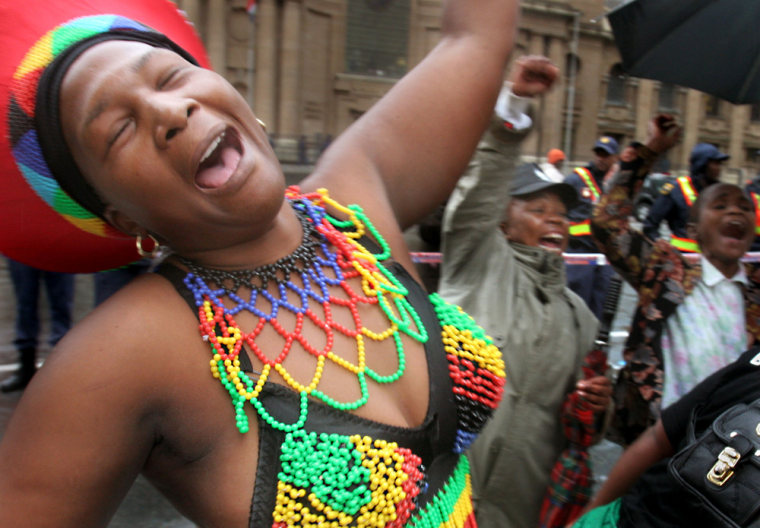The day the trial opened, the woman who accuses a former South African deputy president of rape was hustled in under heavy guard, her face hidden under a cloth. The politician’s supporters have burned photographs of her outside the courtroom — even though her identity was meant to be a secret — and depicted her as a traitor and a tramp.
Inside, the 31-year-old HIV-positive AIDS activist has been subjected to aggressive questioning by the defense about her sexual history.
Already, most of South Africa’s many alleged rape victims do not press charges. Women’s rights activists worry even more victims will be too frightened to come forward after watching Jacob Zuma’s rape trial, which resumes Monday after a recess for most of the past two weeks.
“This case has sent out the message that if you report rape, you will have to be a virginal 19-year-old who has never had sex. Otherwise, everything you have done in your life will be held up to prove that you consented and are somehow to blame,” said Liesl Gerntholz, a legal adviser who is part of the “One in Nine” campaign launched to coincide with the trial. It draws its name from the estimate that only one in nine rape victims reports the assault.
One in Nine activists protested against the treatment of rape victims in front of courts around the country Friday.
“What happens in the Zuma case happens in many other cases all over the country on a daily basis,” said Johanna Kehler, who organized the demonstrations in Cape Town.
High rate of rapes, but few reported
Just over 55,000 rape cases were reported to police in 2003-04, up from 44,750 in 1994-95. There were more than 9,300 cases of indecent assault. Based on reported cases, South Africa has 114 rapes per 100,000 people, compared to a rate of 32 per 100,000 in the United States.
Rates of other violence against women also are high. A study last year by the Medical Research Council found that a woman was killed every six hours by an intimate partner in South Africa, the highest rate reported anywhere in the world. Some 15 percent of them had also been sexually assaulted, it said.
Prof. Rachel Jewkes, director of the Medical Research Council’s Gender and Health Research Unit, described the findings as “completely outrageous” but reflective of the high rate of overall crime in South Africa.
The violence South African women face has been a secondary issue in a trial Zuma’s supporters claim is part of a campaign to ruin his political future. The 63-year-old former freedom fighter had once been widely seen as President Thabo Mbeki’s successor.
Zuma still has lingering ambitions for the top job, despite the rape trial and an unrelated corruption trial that begins in July. Mbeki is barred by the constitution from running again after his second term ends in 2009.
The accuser has known Zuma since she was 5 and called him “uncle.” She has testified under cross-examination that she was raped by other people three times as a child and had an abortion after being raped by someone else at the age of 19.
Victim told rapist she was HIV-positive
She has testified that Zuma entered her room while she was sleeping as a guest at his house on Nov. 2 and raped her. She said she had told him sometime before the alleged rape that she was HIV-positive.
Zuma admits having had sex with the woman at his Johannesburg home last November, but says she consented. His attorney argues she has a history of making false rape accusations, and pressured her into telling the court she had had five lovers.
Zuma’s sexual history has never came under the spotlight, although one judge refused to preside over the trial because Zuma had fathered a child with his sister.
South African judges can decide whether those who have made rape accusations must give evidence about their sexual history. Women’s rights activists fear the judge’s decision to do so in the Zuma case, which has received unprecedented publicity for a rape trial, will encourage more judges to do the same.
Under South Africa’s current sexual offenses law, which dates to the apartheid era, those who claim rape have to prove they did not give consent, which can lead to questioning about how they usually give consent. This is set to change under proposed legislation that has been stuck in parliament since 1998.
Despite their overall gloom, women’s rights groups say they hope the trial will at least finally prompt lawmakers to pass the new Sexual Offenses Act. And the trial comes at a time when abuse of women and children is becoming a hot political issue.
Thabo Sephuma, a South African who works for the International AIDS Society in Geneva, noted that Zuma used to head a campaign dedicated to encouraging moral behavior and its national AIDS Council. Sephuma said the case — in which it emerged that Zuma did not use a condom even though he knew the woman was HIV-positive — was “shameful to society.”
